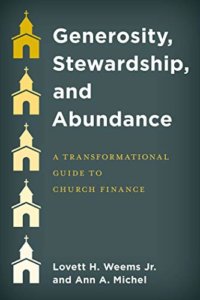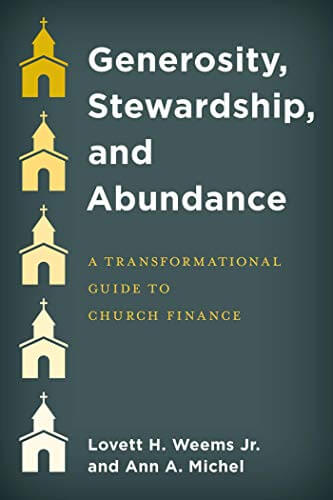Lovett H. Weems Jr. and Ann A. Michel of the Lewis Center explain that churches can play a key role in educating, supporting, and equipping their members to steward their personal financial resources wisely. They outline four simple steps for launching a ministry of financial literacy as an expression of spiritual and pastoral care.
Getting one’s own affairs in order is the first responsibility of a Christian steward. This may seem self-interested or even selfish. But it’s a bit like the airline safety announcement reminding passengers to secure their own air masks before assisting others. People with insufficient financial resources or those who mismanage their resources are unable to respond adequately to God’s call to generosity. Moreover, believing that God lovingly provides for our needs, we align ourselves with God’s purposes when we exercise prudence in caring for our needs and those of our households. Yet many people at all income levels struggle with their finances due to a lack of basic financial management skills.
If sound management of personal finances is the first responsibility of a Christian steward, then churches have a key role to play in educating, supporting, and equipping members for this task. Churches constantly ask their members to consider the church’s financial situation but seldom offer to help members with their own financial challenges.
A form of spiritual and pastoral care
If everything entrusted to us belongs to God and is to be used in accordance with God’s purposes, personal finances and spending decisions are as much a part of Christian discipleship as giving to the church. So, a ministry of financial education is a form of spiritual guidance. It is also a critical form of pastoral care that helps people with real-life concerns — meeting their family’s basic needs, getting out from under the burden of educational or consumer debt, planning for retirement and healthcare needs, and estate planning.
Additionally, when churches help people better manage their resources, they become more generous. A study of operating practices in United Church of Canada congregations found that the churches experiencing growth in giving were four times more likely than other churches to offer some kind of personal financial instruction. And the churches providing financial training had per capita giving 25% above the national average, and the increase in their per capita giving was 11% above the national average. It stands to reason that those who think more deeply and more often about the connection between faith and finances will give more generously. And those empowered to manage expenses and avoid debt are certainly in a better position to give. But spiritual and pastoral care, not enhancing church revenues, should be the primary goals of a financial literacy ministry. If the church’s bottom line is the motivation, people will see right through it and fail to engage.
1. Begin with key questions.
Congregations can minister to the financial concerns of members in many different ways. They must first answer some key questions. What needs are present in the congregation? Is the church located in a struggling community? A middle-class neighborhood? An affluent area? Are there young adults just getting started? Families with children? Or aging baby boomers and retirees? Most churches likely have a mix, of course. But basic budgeting and financial management might be more important in a younger or less affluent church, with retirement and estate planning more relevant in an older, more affluent church.
2. Bring together those with common needs and concerns.
Creating support groups for people facing similar challenges is a simple way to understand concerns and provide guidance. Congregations can bring together those who are unemployed or in career transition, parents figuring out how to pay for college, or families struggling with medical expenses so they can resource and support one another. This approach doesn’t require a great degree of expertise, but it helps to have some people in these groups who have successfully navigated the challenges and can facilitate connections with external resources.
3. Call on the experts.
Another simple homegrown option is to invite people from your congregation or community with financial expertise (bankers, financial planners, trust and estate lawyers, etc.) to lead workshops or seminars. It is essential, however, that these experts come with a desire to help others, not to sell their own services. Some congregations host an annual “ducks in a row” session focused on end-of-life planning — not just wills and estates, but also health directives and making sure essential records are accessible and in good order.
4. Research financial education curricula.
Congregations looking for a more comprehensive, structured approach to financial education can explore commercially available study curricula, video resources, and comprehensive training modules. The most basic programs tend to address spending, budgeting, savings, and debt, while more comprehensive programs also cover more advanced and long-term concerns. Congregations investing in these resources should first research carefully the costs, content, and spiritual perspective.
 This article is excerpted from Generosity, Stewardship, and Abundance: A Transformational Guide to Church Finances (Rowman and Littlefield, 2021) by Lovett H. Weems Jr. and Ann A. Michel. This book is available at Cokesbury, Rowman & Littlefield (Save 30% with code RLFANDF30), and Amazon. Used by permission.
This article is excerpted from Generosity, Stewardship, and Abundance: A Transformational Guide to Church Finances (Rowman and Littlefield, 2021) by Lovett H. Weems Jr. and Ann A. Michel. This book is available at Cokesbury, Rowman & Littlefield (Save 30% with code RLFANDF30), and Amazon. Used by permission.
Related Resources
- 6 Simple Steps to Launch a Planned Giving Program by Ann A. Michel
- 5 Habits Your Church Must Unlearn to Increase Giving by Matt Miofsky and Jason Byassee
- Clergy Personal Finance Resources, free online and video resources from the Lewis Center







